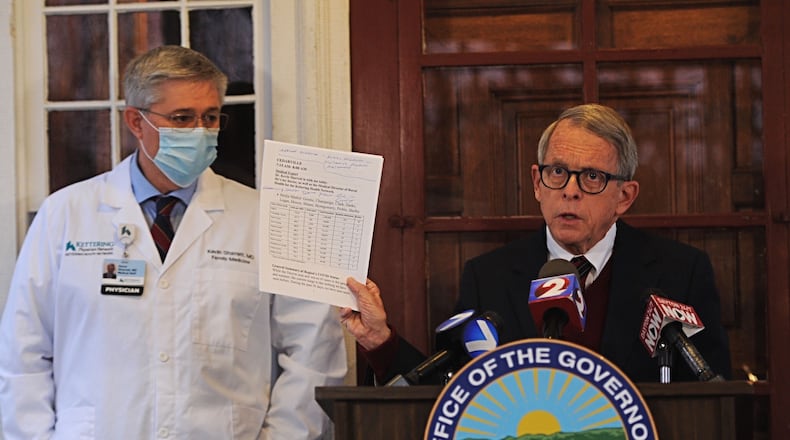The tests will be available through a partnership with Abbott and eMed.
“This new agreement allows communities to more aggressively test for COVID-19 than at any other time during this pandemic,” DeWine said. “This $50 million investment of CARES Act funding will help make testing more broadly available.”
Local health departments have been requesting the rapid tests in hopes that it will help control coronavirus outbreaks, the governor added.
The tests would allow health departments to go into hotspots, test those involved, get the results and contact trace all in the same day.
When asked if the governor has concerns about the accuracy of the tests after he received a false positive from a rapid antigen test in August, DeWine said his result was an “oddity.”
“These tests have come a long way, and we have a very high degree of confidence now in a positive test result for one of these tests,” said Dr. Bruce Vanderhoff, Ohio Department of Health chief medical officer.
While false positives are a possibility, he shared more concerns about the risks of a false negative.
“When an antigen test is positive, statistically speaking it’s positive,” Vanderhoff said. “Not so much with a negative result. I would not advocate anyone taking an antigen test and giving themself a clean bill of health.”
Ohio is scheduled to receive about the same number of vaccines next week as the state expands Phase 1B to residents ages 75 and older, DeWine said.
About 100,000 vaccines were allocated for Ohio this week.
People with a developmental or intellectual disability and a severe congenital, developmental or early onset medical disorder are also scheduled to be eligible for the vaccine next week.
Local developmental disability boards will reach out to those with severe medical conditions to help coordinate vaccination.
DeWine also announced that a statewide curfew set to expire Saturday will be extended. He did not indicate how long it would be extended or if the hours would be adjusted.
Ohio reported 7,271 daily cases of coronavirus Thursday as daily cases increased for the third straight day, according to the Ohio Department of Health.
Cases appeared to drop earlier this week with less than 5,000 cases reported on Monday and Tuesday.
Thursday marked the first time since Saturday that daily cases exceeded 7,000. Ohio has recorded 849,704 total cases of coronavirus.
Deaths increased by 109 for a total of 10,518. It’s tied with the second highest number of deaths reported over the last 21 days.
Ohio reported 306 hospitalizations in the last day, about 100 less than Wednesday. The number of coronavirus patients in the state’s hospitals continue to drop with 3,406 reported Thursday.
In southwest Ohio, there were 936 COVID-19 patients hospitalized, 243 in ICUs and 190 on ventilators.
About the Author

